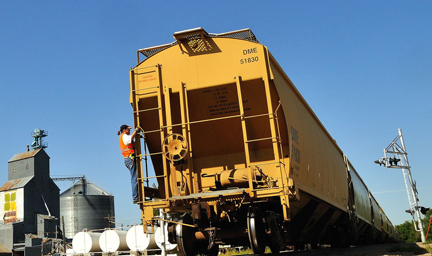

Share
Minnesota’s rail unions say railroad workers – and the public – will benefit from new safety legislation, including the nation’s first regulation for adequate lighting of rail yards.
In the 2014 session, state lawmakers approved and Governor Mark Dayton signed the following measures:
“The Minnesota Yard Lighting Bill,” setting standards for lighting of rail yards, deadlines for repair of malfunctioning lighting and provisions for regular review of lighting where cars or locomotives are switched and inspected or trains are assembled or disassembled frequently.
“The Minnesota Oil Spill Defense Act,” that assures that public first responders, including rail workers, are trained and equipped to deal with derailments and other incidents related to the transportation of oil by rail.
Both of the above measures are contained in a supplemental appropriations bill that also includes funds for three more rail safety inspectors in the Minnesota Department of Transportation and for grade-crossing improvements along high-density corridors for transportation of hazardous materials.
“The Minnesota Railroad Crew Van Law” strengthens the standards for drivers and vehicles conveying rail crews between terminals and trains.
Rail workers want to make their workplaces safer – both for themselves and the public, said Phil Qualy, Minnesota Legislative Director for the United Transportation Union-SMART (Sheet, Metal, Air, Rail and Transportation Workers). The union represents 1,400 railroad conductors, switch foremen, yardmasters and remote control locomotive engineers in Minnesota.
The yard lighting bill “will improve worker safety and the quality of mechanical inspections of rail cars at yards before they move in trains on mainline track,” Qualy testified before the Legislature.
Minnesota has always been in the forefront of rail safety and continues that tradition with its passage of the first-ever lighting bill, he said.
The union also was proud to be part of a broad coalition supporting training to deal with incidents related to the shipment of oil, particularly the increased traffic resulting from the oil boom in North Dakota.
Train derailments, such as those that occurred in Lac-Mégantic, Canada; and Casselton, North Dakota; have cost lives and endangered communities. Union members want to do their public duty by responding to such incidents, but they need the training that will now be offered thanks to the new legislation, Qualy said.
While training is important, he said, the union will continue to pressure the federal government, which has jurisdiction over most rail commerce, to prevent future derailments through retirement or retrofitting of tank cars, increased inspections of trains and requirements for adequate crew sizes and rest periods.
“As train crews, our mission is 100% without exception,” Qualy told lawmakers. “’Safety First’ means no incident.”
Qualy noted, “It has been a good year for railroad labor and our Minnesota AFL-CIO Working Family Agenda at the Minnesota Legislature,” but said some unfinished business remains.
Next year, the union will continue its efforts toward passage of legislation that would increase penalties on railroads that order train crews to block public grade crossings. The practice has become frequent in northern Minnesota as railroads run longer and heavier trains, Qualy said.

